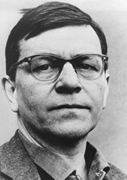|
 Painter, film
director, novelist, and playwright Peter Weiss was born near
Berlin, Germany, on November 8, 1916. Half-Jewish, Weiss was
forced to flee Germany with his family in 1934 because of Nazi
persecution. The family settled temporarily in London, Switzerland,
and Czechoslovakia before finally adopting Sweden as their new
homeland in 1939. Painter, film
director, novelist, and playwright Peter Weiss was born near
Berlin, Germany, on November 8, 1916. Half-Jewish, Weiss was
forced to flee Germany with his family in 1934 because of Nazi
persecution. The family settled temporarily in London, Switzerland,
and Czechoslovakia before finally adopting Sweden as their new
homeland in 1939.
Weiss studied at several institutions including the Polytechnic
School of Photography in London and the Art Academy in Stockholm
before beginning his career as a writer and painter. His first
art exhibition took place in 1936, and his first produced play
was Der Turm or The Tower (1950). He joined the
Swedish Experimental Film Studio in 1952 and made films with
a decidedly surrealistic influence. During this period, he also
taught painting at Stockholm's People's University.
In 1964, Weiss established an international reputation with
the production of The Persecution and Assassination of Jean-Paul
Marat as Performed by the Inmates of the Asylum of Charenton
Under the Direction of the Marquis de Sade at the Schiller
Theater in Berlin. Marat Sade evoked an extraordinary
response from the press who hailed Weiss as "the new Brecht". The play revolves around
the Marquis de Sade who composes and stages a play in 1808, in
the lunatic asylum at Charenton, about the assassination of Marat
in 1793. The play deals with the conflict of individuality versus
the need for revolution. In the original version, the debate
ended at an impasse, but Weiss later reworked the play to favor
Marat's argument, and as the play ends, the inmates of the asylum,
worked into a frenzy, call for revolution. Marat Sade
was immediately recognized by critics as one of the most important
works of the modern theatre. The following year, legendary director
Peter Brook (who also directed the 1966 film version) staged
a famous production of the play in New York City. TIME Magazine,
reviewing the production, described the play as:
"... a hypodermic needle plunged directly into the playgoer's
emotional bloodstream. It hypnotizes the eye and bruises the
ear. It shreds the nerves; it vivisects the psyche--and it may
scare the living daylights out of more than a few playgoers!"
Weiss' next play, Der Ermittlung or The Investigation
(1965), continues the theme of political drama as it presents
the playwright's version of events at the Frankfurt Auschwitz
trials of 1963-65. Described by Weiss as an "oratoria with
11 cantos", the play confronts the men who carried out the
mass murders at Auschwitz. Other political plays by Weiss include
Gesang vom lusitanischen Popanz or Song of the Lusitanian
Bogey (1967), Vietnam-Diskurs or Vietnam-Discourse
(1968), and Trotzki im Exil or Trotsky in Exile
(1970). Weiss also wrote three novels: The Shadow of the Body
of the Coachman (1960), The Leavetaking (1961), and
Exile (1962).
In 1970, Weiss suffered a heart attack, and his writing began
to slow down. He adapted a few pieces from works by other authors
such as Kafka and Strindberg, but for
the most part, after 1973, his pen grew silent. He died in Stockholm
on May 10, 1982.
Weiss' awards include the Charles-Veillon Prize (1963), the
Lessing Prize (1965), the Heinrich Mann Prize (1966), the Carl
Albert Anderson Prize (1967), the Thomas Dehler Prize (1978),
the Cologne Literature Prize (1981), the Büchner
Prize (1982), the Bremen Literature Prize (1982), the De Nios
Prize (1982), and the Swedish Theatre Critics Prize (1982).
- Search eBay! for Peter Weiss collectibles

|